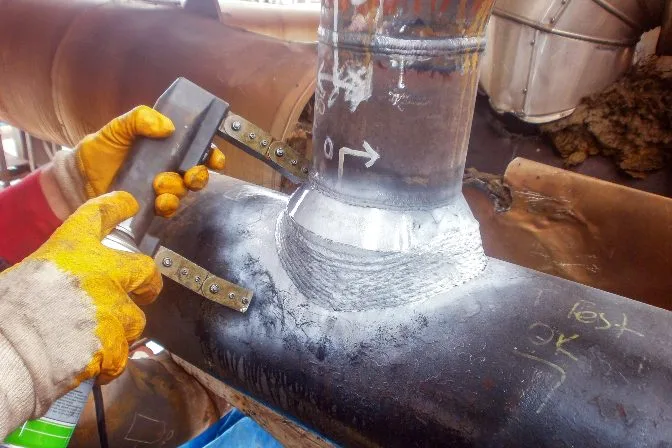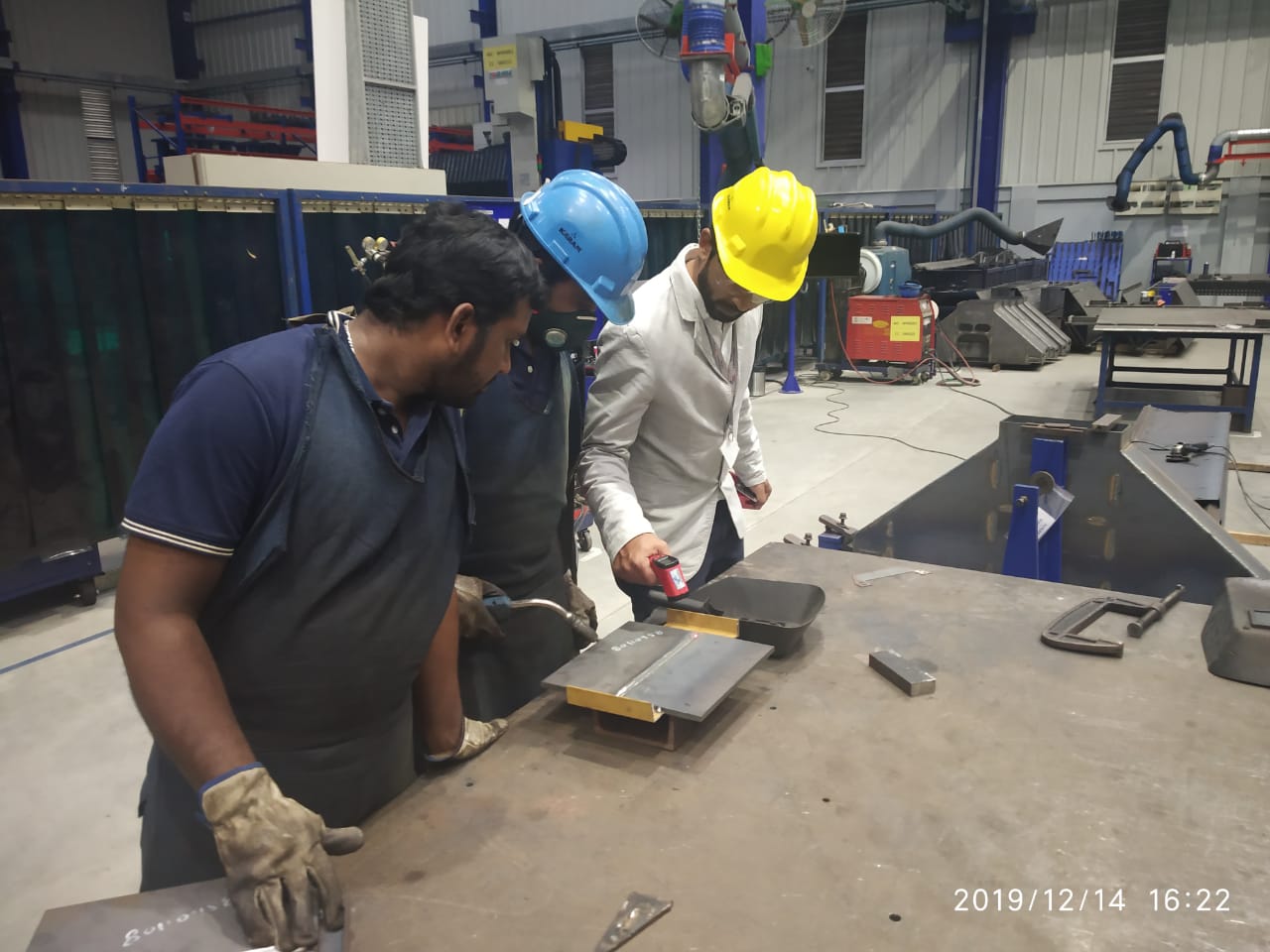Why Choose Expert Welding Inspection Gilbert Arizona for Your Jobs?
Why Choose Expert Welding Inspection Gilbert Arizona for Your Jobs?
Blog Article
The Influence of Rigorous Welding Inspection on Industry Standards: Encouraging Safety And Security, Reliability, and Conformity Throughout Different Fields
The role of rigorous welding examination is significantly recognized as an important part in enhancing market standards, where conformity, safety, and integrity take priority across varied sectors. What transformations might we anticipate in welding approaches as the demand for top quality and safety and security intensifies?
Relevance of Welding Assessments
Identifying the critical function of welding evaluations in maintaining quality and safety requirements, sector specialists focus on these assessments to guarantee structural stability. Welding inspections function as an important checkpoint in the fabrication procedure, determining issues that can endanger the durability and security of welded structures. By systematically evaluating welds, inspectors can detect problems such as insufficient penetration, porosity, and cracks, which might not be visible to the naked eye.
The value of these assessments prolongs past mere conformity; they are necessary for guarding lives and protecting investments. In important sectors such as aerospace, building and construction, and manufacturing, a solitary malfunctioning weld can result in disastrous failings, resulting in both monetary loss and human casualties. Applying rigorous inspection protocols alleviates these risks and boosts total job integrity.
Moreover, regular welding examinations cultivate a culture of top quality throughout organizations, encouraging welders to stick to best techniques and maintain high standards in their work. This commitment to quality not only boosts functional performance however also reinforces the credibility of business within their corresponding fields. Therefore, welding inspections are vital in advertising security, integrity, and compliance throughout various industries.
Secret Sector Specifications and Regulations
The framework of welding assessments is underpinned by a robust collection of market criteria and regulations that regulate practices across numerous industries. Key institutions, such as the American Welding Culture (AWS) and the International Company for Standardization (ISO), develop guidelines that make certain high quality and safety in welding procedures. AWS D1.1 describes important requirements for welding steel structures, while ISO 3834 defines top quality needs for combination welding.
In enhancement to these certain standards, industry guidelines like the American National Requirement Institute (ANSI) and Occupational Security and Health Management (OSHA) requireds further improve compliance by establishing safety and security methods and operational finest techniques. These guidelines are crucial in markets such as aerospace, construction, and manufacturing, where welding integrity is extremely important.
Furthermore, sector-specific requirements, such as those from the American Society of Mechanical Designers (ASME) for pressure vessels, provide added layers of scrutiny to make certain that welds fulfill rigorous safety and performance criteria. Adherence to these criteria not just assists in regulatory conformity but additionally fosters a culture of high quality and reliability throughout the welding sector, inevitably safeguarding public welfare and enhancing functional effectiveness.

Benefits of Compliance and Integrity
Constantly sticking to industry requirements and regulations in welding assessments yields considerable advantages, boosting general integrity and performance. The primary benefit is the guarantee of top quality in welded joints, which straight adds to the safety and security of frameworks and devices. Compliance with well established criteria reduces the threat of failing and tragic incidents, thereby shielding both human life and valuable properties.
Furthermore, organizations that prioritize rigorous welding inspections promote a society of responsibility and professionalism and reliability. This commitment not only bolsters the online reputation of the firm yet likewise infuses confidence in clients and stakeholders relating to the integrity of product you could try these out or services. Reliable welding processes result in decreased costs linked with rework, repair services, and prospective lawful liabilities originating from below average handiwork.
Additionally, maintaining conformity with market requirements facilitates smoother regulatory communications, as companies can conveniently demonstrate adherence to needed protocols (Welding Inspection Gilbert Arizona). This positive technique can lead to useful collaborations and chances within the industry, in addition to accessibility to new markets
Difficulties in Welding Assessment
Browsing the complexities of welding evaluation presents a myriad of challenges that can impede conformity with industry standards. The absence of standard training for inspectors can result in different interpretations of examination standards, which might compromise security and reliability.
Another obstacle depends on the access of sophisticated inspection devices - Welding Inspection Gilbert Arizona. While innovations such as ultrasonic screening and radiography can enhance discovery abilities, their execution may be restricted by cost or availability, especially in smaller sized operations. This variation can lead to a dependence on less efficient inspection techniques, enhancing the threat of unnoticed imperfections
In addition, the hectic nature of contemporary production frequently pressures examiners to prioritize rate over thoroughness, potentially ignoring essential issues. Last but not least, governing compliance can be daunting due to the advancing nature of industry standards, leaving companies battling to stay up to date with the most recent requirements. These challenges require constant enhancement in assessment techniques to other ensure the integrity of welded frameworks across numerous industries.
Future Trends in Welding Practices
Arising innovations and progressing approaches are established to change welding techniques in the coming years. Improvements in automation, such as robotic welding systems, are acquiring traction, improving precision and efficiency while reducing human mistake. These systems will not only speed up manufacturing however likewise facilitate consistent quality assurance, addressing some of the obstacles dealt with in manual welding.
In addition, the combination of expert system (AI) and artificial intelligence into welding procedures is positioned to reinvent inspection and surveillance. Real-time information analytics will certainly enable anticipating maintenance, permitting positive treatments that decrease downtime and rise security. Augmented fact (AR) and digital reality (VIRTUAL REALITY) modern technologies are coming to be important in training welders, supplying immersive experiences that enhance ability advancement without the threats associated with conventional approaches.
Sustainability is likewise a crucial fad, as markets seek greener methods. The fostering of environment-friendly products and methods, along with energy-efficient machinery, will likely become standard. As sectors adjust to these adjustments, the focus will shift towards better compliance with security and ecological policies, making sure that welding techniques not just meet current criteria however additionally lead the way for a safer and more sustainable future.

Final Thought
In conclusion, strenuous welding inspections considerably improve page industry standards by making certain safety, integrity, and conformity across numerous fields. As markets proceed to prioritize functional stability, the significance of extensive evaluations will only enhance, ultimately profiting companies and society at huge.
The function of strenuous welding evaluation is progressively recognized as an important part in improving market criteria, where compliance, integrity, and safety take precedence throughout diverse fields. Therefore, welding examinations are vital in promoting security, integrity, and compliance throughout numerous markets.
Secret institutions, such as the American Welding Culture (AWS) and the International Company for Standardization (ISO), develop guidelines that make sure top quality and safety and security in welding operations. AWS D1.1 describes vital requirements for welding steel frameworks, while ISO 3834 specifies top quality needs for blend welding.
In verdict, rigorous welding assessments significantly boost market criteria by guaranteeing safety, dependability, and conformity throughout various markets.
Report this page